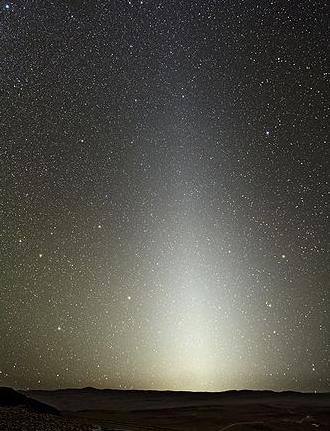Venus, Jupiter, Mercury west after sunset. Also, zodiacal light!

Zodiacal light seenfrom Paranal. Image Credit: Wikipedia Commons
Everything you need to know about zodiacal light or false dusk
Zodiacal light looks like a large but faint milky-colored pyramid of light with its apex reaching perhaps halfway up the sky. It is caused by sunlight reflecting off interplanetary dust particles that orbit the sun within the inner solar system. People at mid-northern latitudes can see the zodiacal light after dusk at present because the ecliptic – the plane of the solar system – hits the horizon at a particularly steep angle on late winter evenings. The farther south you live within the Northern Hemisphere’s temperate zone, the more likely you are to spot the zodiacal light.
Find the elusive planet Mercury. To find Mercury, look first for the blazing planets Venus and Jupiter at dusk. Mercury sits below these worlds, appearing over the sunset point on the horizon about 45 to 75 minutes after the sun goes down. Mercury shines as brightly as a 1st-magnitude star, but its luster is tarnished by the twilight glare. If you can’t see Mercury with the eye alone, then try binoculars. At mid-northern latitudes, Mercury sets about 80 minutes after the sun.
Top tips for using ordinary binoculars for stargazing
You won’t see the zodiacal light until the sky is completely dark, so Mercury will be setting as this astronomical wonder comes into view.
2012 guide to the five visible planets
Don’t know sunset time? Try a sky almanac
Bottom line: In March 2012, we are seeing the planets Jupiter and Venus in the west after sunset. They are very bright – an amazing sight. You can also still find the innermost planet Mercury below Venus and Jupiter. It is nearing the end of its evening apparition – so look soon! On moonless nights in March and April 2012, look in the west – in the direction of the dazzling planets Jupiter and Venus – for the mysterious zodiacal light! Although the planets can be seen from the city, viewing the zodiacal light requires a country location.
http://earthsky.org


No hay comentarios:
Publicar un comentario